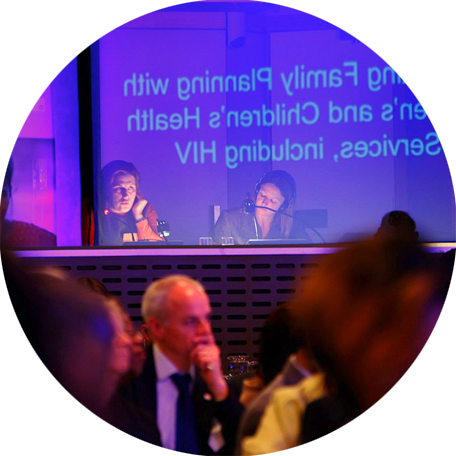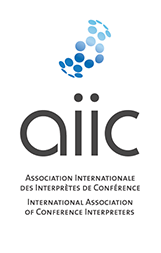What we do
Interpreting? Translating? What’s the difference? Let’s get this straight…
Call an interpreter a "translator" and you might get an unexpected response.
Interpreters are extremely proud of what they do and the skills required to do it, beyond the purely linguistic – concentration, speed of thought, mental dexterity as well as a broad general knowledge, coupled with the ability to keep calm when it gets stressful, which it often does! Like translators, interpreters also convey a message from one language to another, not simply replacing the words of one language by those of another, but that’s where all similarity ends.

─── The spoken word
The spoken word
In a nutshell, interpretation is spoken, translation is written. Interpretation therefore makes use of particular linguistic resources, transmitting the original speaker's ideas with their particular rhythm and intonation, making use of rhetorical devices and yes, even gestures.
─── Time constraints
Time constraints
Interpretation is carried out in real time (simultaneously) or very close to it (consecutively). The interpreter has no time to refer to the written resources available to translators, hence the importance of preparing thoroughly for every assignment (and, by extension, the need for organisers and speakers to make their material available in advance). With so many presenters these days choosing to read out a pre-prepared statement rather than speak off the cuff, interpreters are also required to receive, understand, process, and reconstruct information at extreme speed in real time.
The context of communication
In translation there is always a gap between the writing of a text by an author and its reception by the readers. In interpretation, on the other hand, communication is immediate, involving an interaction between speakers and listeners that passes through the interpreter.
That apart, translators often spend a long time working on one text, while interpreters, often working in a team, are faced with people speaking and communicating right now.
─── Sign languages
Sign languages
Sign language interpreters are no different, except that they interpret spoken languages into sign languages or sometimes between sign languages. With numerous distinct national sign languages in addition to International Sign (IS), these specialist interpreters play an important role in allowing the Deaf community to actively participate in meetings and other conversations.
So, there you have it. Interpretation is a multifaceted profession – a linguistic one, certainly, but also an information and communication one.
How interpreters are employed
Interpreters come in various guises:
Staff interpreters
Staff interpreters are temporary or permanent employees of national or international organisations.
Staff interpreters are salaried employees, their work as rich and diverse as the organisations for which they work, many of them represented on the Staff Interpreters Committee and included in the list of major employers. They include international and regional organisations, international and national criminal courts and tribunals, national organisations and institutions, governmental ministries, parliaments, the armed forces, as well as non-profit and for-profit entities.
Freelance interpreters
Freelance conference interpreters are employed on a short-term basis. They work for various clients in succession, depending on demand and their capabilities.
Freelance interpreters enjoy freedom and mobility. In theory, they are free to organise their work as they feel fit, accepting or rejecting the jobs they are offered, though economic reality may dictate differently. Since they work for a wide variety of organisations, they cover a vast range of subjects and work in many different fields.
A freelance interpreter's reputation depends on the quality of their work. Clients and other interpreters will call on their services on the basis of this reputation, built up over time.
Consultant interpreters
Consultant interpreters are working interpreters who have chosen to take on an additional role, acting as a liaison between conference organisers and teams of interpreters. They recruit teams of interpreters to suit their clients’ requirements, taking account of working languages, subject matter, meeting location, and their knowledge of the interpreting market.
The role of the consultant interpreter is to provide the meeting organiser with high-quality, bespoke interpretation services tailored to the organisational needs of the meeting, while ensuring optimal working conditions for the interpreters. Since there has to be something in it for the consultant interpreter too, this additional service that requires specialized skills and knowledge besides the necessary interpreting ability tends to be rewarded through consulting and management fees.
In addition to conference interpreting, there are a number of other ways that interpreters work, and many conference interpreters are also active show these other areas of the profession.
